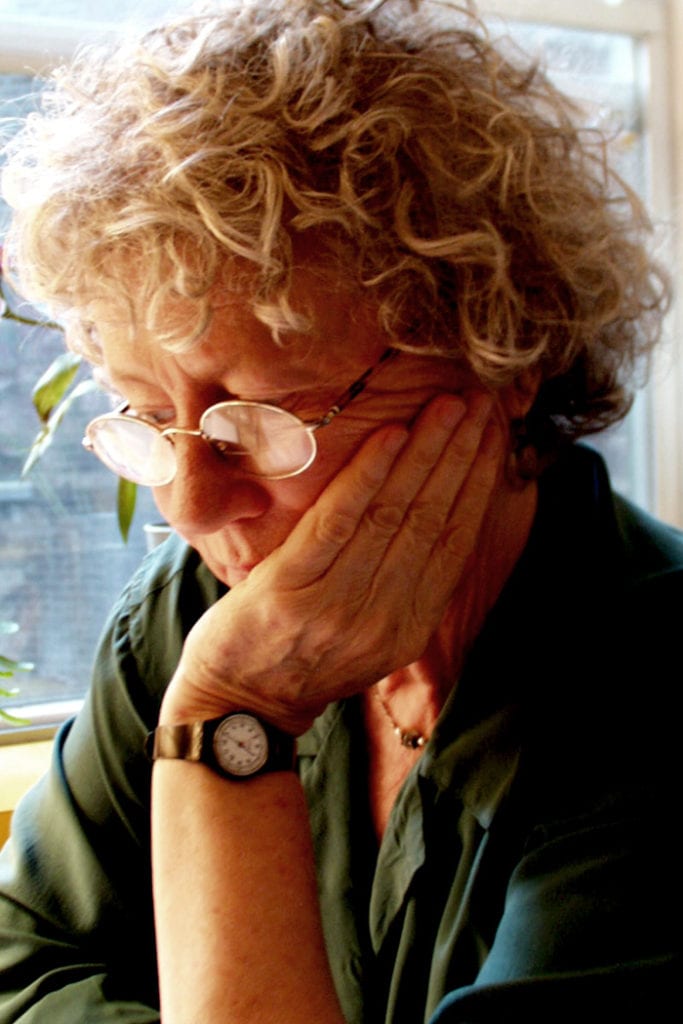
We mourn the loss of former State Poet of New York, Pulitzer Prize finalist, professor of literature, and beloved poet Jean Valentine, who died on December 29, 2020 in New York, NY. She was 86.
Valentine published 14 collections of poetry, including Break the Glass (Pulitzer Prize Finalist for Poetry, 2011), Door in the Mountain: New and Collected Poems 1965-2003 (National Book Award Winner in Poetry, 2004), and Dream Barker and Other Poems (Yale Series of Younger Poets Winner, 1965).
Known for her linguistic leaps, unique consciousness, and concision, Valentine’s poetry tackles vast concepts such as memory and morality through personal and political lenses. In a review of Break the Glass, The New York Times Book Review said: “Valentine has a gift for tough strangeness, but also a dreamlike syntax and manner of arranging the lines of… short poems so as to draw us into the doubleness and fluency of feelings.”
Valentine’s poems act like dreams, imaginative yet tethered to the world as we know it. In an interview with Amy Newman in Ploughshares, Valentine stated: “My dreams were very important to me right in the beginning. I had a teacher in college who said ‘You could write from your dreams’ and that was like being given a bag full of gold.”
Michael Wiegers, her editor at Copper Canyon Press, said, “Jean Valentine is a poet, and a person, whose grace, delicacy and dignity are rooted in a fierce moral conviction and purpose. She was unfailingly inclusive and attentive to those around her. This attentiveness along with an ability to listen carefully was made invitingly evident in her poems.”
Wiegers went on to say, “A Jean Valentine poem is often understated and quiet, yet is not impersonal. Entering her poems almost feels like a secret is being shared with you, a secret you’ve known all along yet which she is sharing as a reminder. A reminder that we are all here together with our collective senses. Her humility was in service to a desire for fairness and doing right, while her understated voice was an invitation to solidarity and companionship. Her poems remind us each that we belong.”
The author Adrienne Rich wrote of Valentine’s work: “Looking into a Jean Valentine poem is like looking into a lake: you can see your own outline, and the shapes of the upper world, reflected among rocks, underwater life, glint of lost bottles, drifted leaves. The known and familiar become one with the mysterious and half-wild, at the place where consciousness and the subliminal meet. This is a poetry of the highest order, because it lets us into spaces and meanings we couldn’t approach in any other way.”
Jean Valentine was born in Chicago, Illinois on April 27, 1934. She received a BA from Radcliffe College in 1956 and lived most of her life in New York City. Her first book of poems, Dream Barker and Other Poems, won the Yale Series of Younger Poets Award in 1965. She authored 14 collections of poetry, including The River at Wolf (1992); Little Boat (2007); Door in the Mountain: New and Collected Poems, 1965–2003, which won the National Book Award; and Break the Glass (2010), a finalist for the Pulitzer Prize. Her latest collection is Shirt in Heaven, published by Copper Canyon Press in 2015.
Valentine has been awarded grants and fellowships from the Rockefeller Foundation, the National Endowment for the Arts, the New York State Council on the Arts, the Guggenheim Foundation, and the Bunting Institute. In 2000, she received the Shelley Memorial Prize from the Poetry Society of America. She is the recipient of the 2009 Wallace Stevens Award from the Academy of American Poets. In 2017, she was awarded Yale University’s Bollingen Prize for Poetry. Valentine taught literature at New York University until 2004, as well as workshops and seminars at the 92nd St. Y, the University of Pittsburgh, Sarah Lawrence College, the Fine Arts Work Center in Provincetown, and Columbia University.
“Sanctuary”
by Jean Valentine
People pray to each other. The way I say “you” to someone else, respectfully, intimately,
desperately. The way someone says “you” to me, hopefully, expectantly, intensely…
—Huub Oosterhuis
You who I don’t know I don’t know how to talk to you
—What is it like for you there?
Here … well, wanting solitude; and talk; friendship—
The uses of solitude. To imagine; to hear.
Learning braille. To imagine other solitudes.
But they will not be mine;
to wait, in the quiet; not to scatter the voices—
What are you afraid of?
What will happen. All this leaving. And meetings, yes. But death.
What happens when you die?
“… not scatter the voices,”
Drown out. Not make a house, out of my own words. To be quiet in
another throat; other eyes; listen for what it is like there. What
word. What silence. Allowing. Uncertain: to drift, in the
restlessness … Repose. To run like water—
What is it like there, right now?
Listen: the crowding of the street; the room. Everyone hunches in
against the crowding; holding their breath: against dread.
What do you dread?
What happens when you die?
What do you dread, in this room, now?
Not listening. Now. Not watching. Safe inside my own skin.
To die, not having listened. Not having asked … To have scattered
life.
Yes I know: the thread you have to keep finding, over again, to
follow it back to life; I know. Impossible, sometimes.